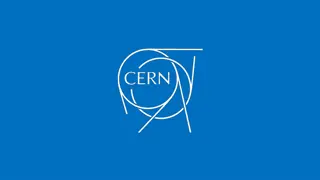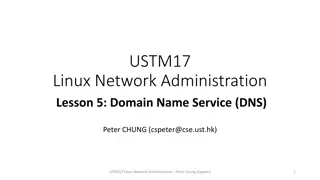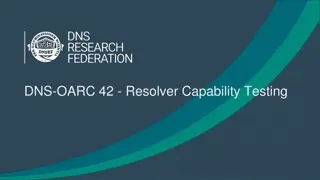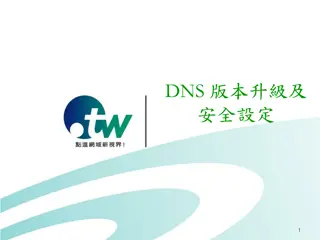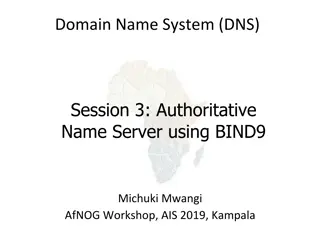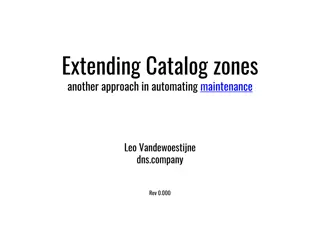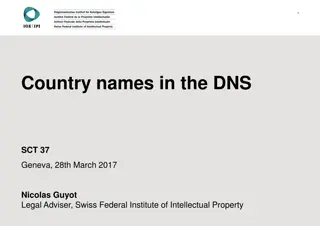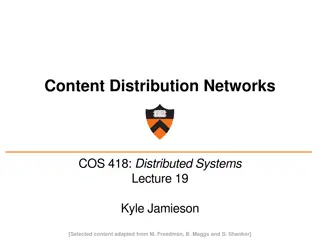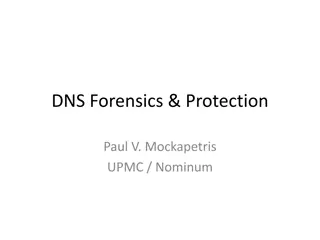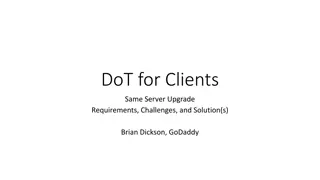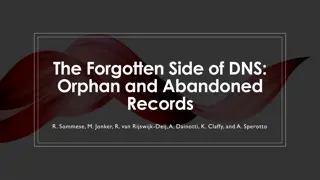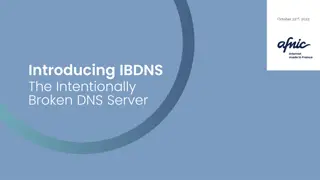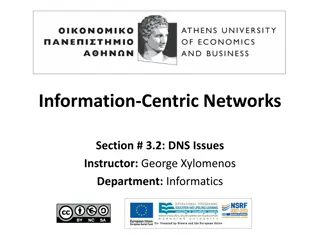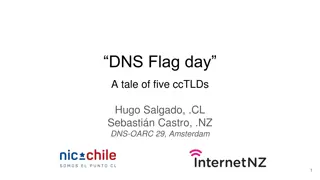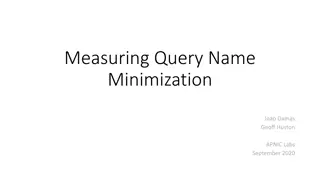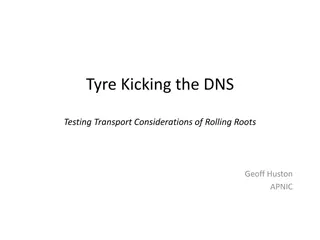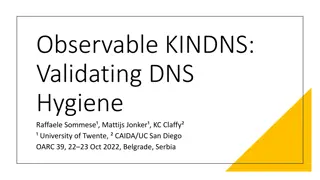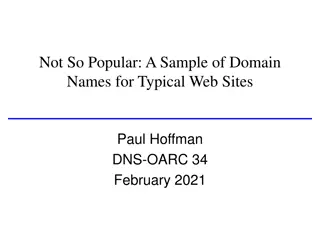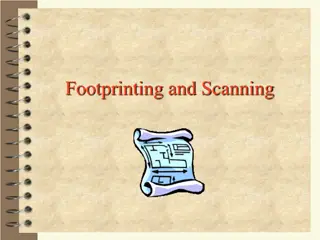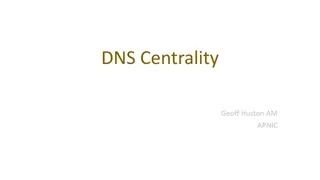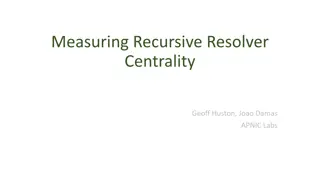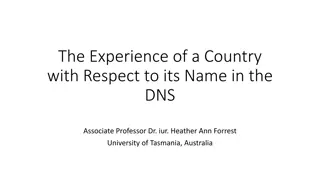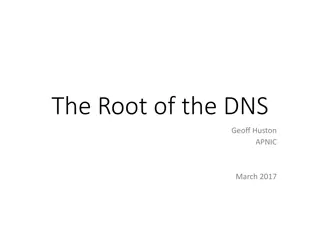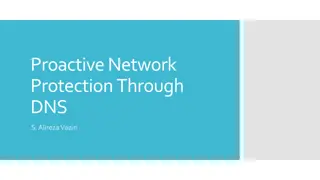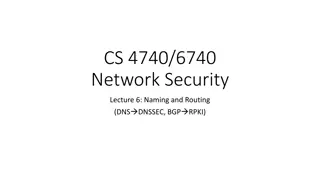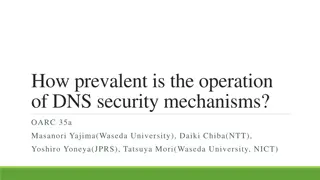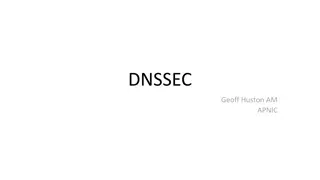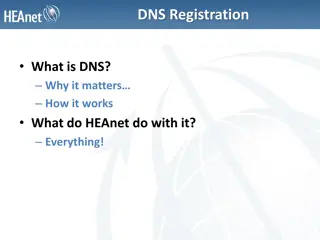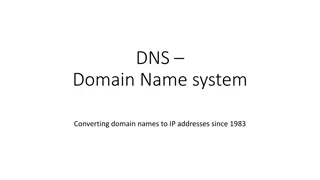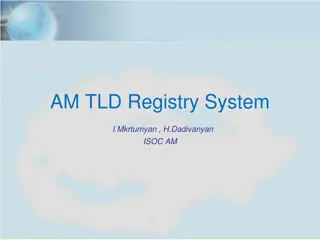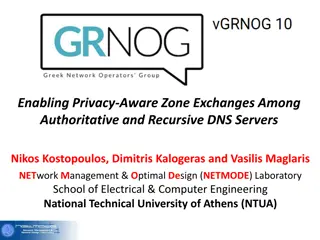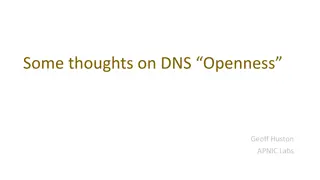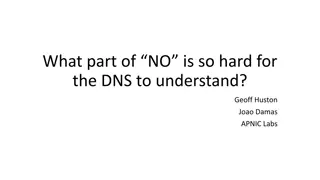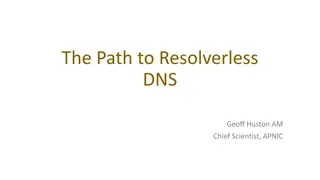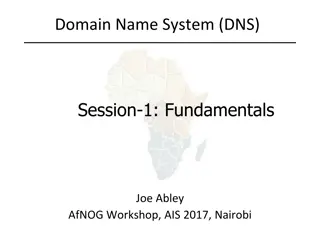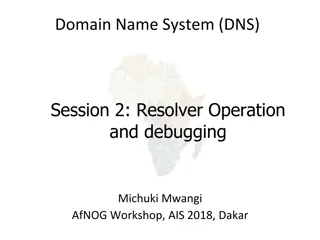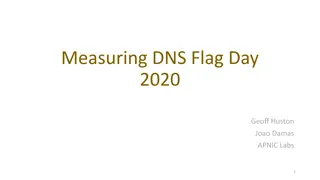Roadmap for DNS Load Balancing Service at CERN - HEPiX Autumn 2020 Workshop
This roadmap presented by Kristian Kouros on behalf of the DNS Load Balancing Team at CERN outlines the introduction, implementation, and upgrades associated with the DNS Load Balancing Service. It covers topics such as system architecture, LBClient metrics, and the overall structure of the service.
3 views • 29 slides
Understanding Domain Name Service (DNS) in Linux Network Administration
Domain Name Service (DNS) is a crucial scheme for resolving hostnames in a network, eliminating the need to record all hostnames in a local file. The Berkeley Internet Name Domain service (BIND) is a prominent DNS implementation providing efficient hostname resolution. DNS organizes hostnames in a h
0 views • 35 slides
DNS Research Federation: Advancing Understanding of Cybersecurity Impact
The DNS Research Federation, a UK non-profit organization, aims to advance the understanding of the Domain Name System's impact on cybersecurity, policy, and technical standards through education, research, and improved data access. Motivated by the need to measure resolver capabilities, they have d
0 views • 17 slides
Understanding DNS Firewall Architecture at Virginia Tech
Virginia Tech implements Response Policy Zone (RPZ) as a mechanism in the DNS system to protect clients from malicious domains. The RPZ allows recursive resolvers to customize responses for specific zones, enhancing security against malware callbacks. Working with campus partners, the RPZ database a
0 views • 11 slides
Understanding BIND DNS Security Vulnerabilities and Configuration
Dive into the world of BIND DNS with a focus on security vulnerabilities, zone transfer restrictions, rate limiting, and essential configuration options. Explore key topics such as ISC mailing lists, CVE announcements, and best practices for setting up BIND DNS servers.
1 views • 16 slides
Understanding DNS Replication with BIND9
Explore the intricacies of DNS replication using BIND9, including the role of authoritative name servers, the importance of serial numbers, and the process of data transfer between master and slave servers. Discover insights on maintaining consistency in zone data to ensure smooth DNS operations.
2 views • 39 slides
Automating DNS Maintenance with Catalog Zones: A New Approach
Explore a fresh method for automating maintenance in DNS servers through catalog zones, focusing on dynamic configuration data. Learn about generating includes for various DNS daemons and enhancing zone management efficiency. Discover how to streamline provisioning and loading processes with Python,
0 views • 12 slides
Country Names in the Domain Name System (DNS)
The Domain Name System (DNS) plays a crucial role in attributing top-level and second-level domains to country names. This system is global and managed by ICANN, not national offices, allowing for unique attribution to one person. Examples of country names registered as second-level domains are prov
1 views • 7 slides
Understanding Domain Name System (DNS) and Content Distribution Networks (CDNs)
This lecture delves into the fundamentals of the Domain Name System (DNS), highlighting the differences between DNS hostname and IP address, the various uses of DNS, the original design challenges of DNS, its goals and non-goals, and the hierarchical structure of the DNS. It also covers the role of
0 views • 60 slides
DNS Forensics & Protection: Analyzing and Securing Network Traffic
DNS Forensics involves using DNS traffic to analyze network health, detect anomalous behavior, and combat malicious activities. By understanding DNS activity on systems and implementing defense strategies, users and network providers can enhance security and privacy.
0 views • 16 slides
Upgrade Requirements, Challenges, and Solutions for Same-Server DoT Implementation
Explore the transition from Do53 to DoT without changing resolvers, addressing challenges in DNS resolvers, TLS standards, and forwarder complications. Discover partial solutions through DANE TLSA certificates, DNS zone publishing, and DNSSEC trust anchors for enhanced security and upgrade process e
0 views • 14 slides
The Forgotten Side of DNS: Orphan and Abandoned Records
DNS zone administration can be complex, leading to misconfigurations like orphan and abandoned records. Orphan records are former glue records no longer needed, while abandoned records have related domains but are unnecessary. This analysis extends prior research, examining 2K TLDs over 25 months to
0 views • 19 slides
Unveiling IBDNS: The Intentionally Broken DNS Server
Uncover the unique server, IBDNS, intentionally designed to simulate faulty DNS scenarios for testing. Explore its unconventional testing tools, coverage of RFCs, and architecture focusing on file zones and bit-flip examples. Delve into testing methodologies and response simulations tailored for dia
0 views • 17 slides
Understanding DNS Performance and Issues in Information-Centric Networks
DNS (Domain Name System) plays a crucial role in the Internet and web infrastructure, impacting scalability and content delivery. This content delves into DNS issues, comparing ISP DNS with Google DNS and OpenDNS in terms of latency, caching, and performance with CDNs. It explores how caching, third
0 views • 12 slides
Client Privacy Preservation through Secured DNS - Feisty Forwarders
Feisty Forwarders, led by Dr. Amrita Mishra, is a team dedicated to client privacy preservation via secured DNS. They focus on developing protocols that hide IP addresses and encrypt all incoming and outgoing traffic to protect users from potential spies on the internet. With expertise in programmin
0 views • 11 slides
Understanding DNS Flag Day and EDNS: A Comprehensive Overview
DNS Flag Day marks a coordinated effort to remove workarounds in DNS implementations, impacting domains in various ccTLDs like .CL, .CZ, .SE, .NU, and .NZ. Enhanced DNS (EDNS) provides a mechanism for supporting new options, but issues arise from poor DNS implementations causing delays and hindering
0 views • 20 slides
Exploring Query Name Minimization in DNS Resolution
Delve into the world of query name minimization in DNS resolution, examining its adoption from the perspectives of end users, queries, and recursive resolvers. Understand the common resolver implementations and the techniques described in RFC 7816. Gain insights from user measurements and results fr
0 views • 18 slides
DNS Testing and Signatures Rollover Analysis
In this content, Geoff Huston from APNIC discusses DNS testing and transport considerations, focusing on the rolling roots process. The discussion includes insights on rolling root keys, KSK repositories in the US and Amsterdam, and a step-by-step guide on how to perform a Key Signing Key (KSK) roll
0 views • 39 slides
Improving DNS Security with KINDNS Best Practices
Best practices for improving DNS resilience and security are crucial for protecting billions of Internet users. Initiatives like KINDNS aim to establish global norms to enhance DNS security by codifying these practices. The KINDNS group focuses on practices for authoritative and recursive nameserver
0 views • 17 slides
Understanding Domain Names for Authoritative DNS Servers
Researchers need to accurately define the types of authoritative DNS servers they sample when measuring server properties. This study focuses on collecting domain names used for web servers to assess typical domain name characteristics, highlighting the importance of accurate data for research purpo
0 views • 7 slides
Cybersecurity Footprinting and Scanning Techniques
Learn about the techniques involved in cybersecurity footprinting and scanning to protect against information gathering, target acquisition, and unauthorized access. Explore topics such as network enumeration, DNS interrogation, and scanning methods to identify vulnerabilities and enhance security m
0 views • 8 slides
Understanding DNS Centrality: The Internet's Core Challenge
Delve into the critical issue of DNS centrality on the Internet, its impact on competition and innovation, and the consolidation trends shaping service provision. Explore the implications of a single entity controlling the DNS and its broader influence on the online ecosystem in just 20 minutes. Unc
0 views • 50 slides
Challenges of DNS Centrality in Internet Infrastructure
The presentation discusses the issue of centrality in the DNS and its impact on the Internet. It explores the implications of concentration of control, economic considerations, and the history of consolidation in DNS services. The importance of competition, innovation, and consumer benefits are high
0 views • 47 slides
Understanding Factors in Country Names and DNS Confusion
This content explores the intricacies of country names in the Domain Name System (DNS), covering long-form, short-form, colloquial/native names, and more. It delves into the case of Switzerland as an example, detailing its various official and colloquial names. Additionally, the text discusses facto
0 views • 4 slides
Understanding the Domain Name System (DNS) Structure
The Domain Name System (DNS) is a distributed data collection utilizing a delegation hierarchy to reflect the hierarchical structure of domain names. This system resolves DNS names by discovering information through iterative searches, starting from the root zone. The process involves querying serve
0 views • 25 slides
Proactive Network Protection Through DNS Security Insights
Exploring proactive network protection methods using DNS, security challenges, botnet threats, firewall management, malware controls, and DNS-based malware control. Discussions on DNS security vulnerabilities, DNSSEC, threat intelligence, machine learning, and best practices like RPZ for DNS protect
0 views • 29 slides
Understanding Network Security Fundamentals
Explore the critical components of network security focusing on DNS, BGP, and RPKI. Learn about the importance of trust on the Internet, potential attacks, and measures to secure DNS and BGP protocols. Delve into naming hierarchy, DNS structure, hierarchical administration, and DNS server functions.
0 views • 70 slides
Understanding DNS Security Mechanisms
Various DNS security mechanisms like DNSSEC, DNS Cookies, CAA, SPF, DMARC, and more are crucial in protecting against security threats targeting the DNS ecosystem. This analysis delves into the prevalence and effectiveness of these mechanisms in countering vulnerabilities such as cache poisoning, am
0 views • 29 slides
Understanding DNSSEC: Adding Digital Signatures to DNS Responses
DNSSEC (Domain Name System Security Extensions) allows for the addition of digital signatures to DNS responses, ensuring the authenticity, completeness, and currentness of the data received by a client. By validating the digital signature, clients can trust the response received is genuine and unalt
0 views • 27 slides
Understanding DNS Registration: Importance and Process Explained
DNS registration is crucial for establishing online presence. It involves registering domain names like web pages and email addresses. HEAnet delegates to hosting providers, like IEDR, who ensure quality service and support customers. Timing is key - think about DNS registration at the project's sta
0 views • 7 slides
Evolution of Domain Name System (DNS) Since 1983
Domain Name System (DNS) has played a crucial role in converting domain names to IP addresses since its inception in 1983. This system has revolutionized the way we navigate the internet, translating human-readable names into machine-readable IP addresses. The distributed and hierarchical nature of
0 views • 23 slides
Understanding DNS and Network Address Translation
DNS, or Domain Name System, is a vital component of the internet that translates domain names into IP addresses. This essential system allows users to easily navigate the web using familiar names instead of complex numbers. Explore the importance of DNS, its structure, and how it functions within co
0 views • 41 slides
Internet Society Armenia's Role in Managing and Enhancing Armenia's DNS Infrastructure
Internet Society Armenia (ISOC.AM) actively manages Armenia's country code top-level domain (ccTLD) and plays a crucial role in ensuring the stability, resilience, and security of the country's DNS servers. Through partnerships with organizations like ICANN and RIPE NCC, ISOC.AM oversees the operati
0 views • 23 slides
Enhancing Privacy in DNS Zone Exchanges
This work presents a privacy-aware schema for efficient distribution of Authoritative DNS Server zones to Recursive DNS Servers or scrubbing services. By utilizing probabilistic data structures like Cuckoo Filters, the system ensures efficient zone mapping, compatibility with existing DNS infrastruc
0 views • 17 slides
DNS Openness - Exploring the Impact of DNS Regulations on Information Access
DNS openness is essential for unrestricted access to information and services. However, varying regulatory requirements and ISP practices result in different DNS resolutions globally, impacting user experiences. Despite these challenges, threats like malware mitigation justify such deviations from a
0 views • 41 slides
DNS Query Behavior Analysis: Understanding Queries for Non-Existent Names
Exploring the unexpected high number of DNS queries for non-existent names and the factors contributing to this behavior, including Happy Eyeballs and client query patterns. Revealing insights into the complexities of DNS resolution processes.
0 views • 27 slides
Understanding Resolverless DNS and its Implications
Resolverless DNS, as discussed by Geoff Huston, delves into the architecture and issues of the DNS system. It explores the impact of resolver caches on speed and predictability of resolution, the potential for filtering DNS content, and the significance of metadata collection. The evolution of DNS s
0 views • 30 slides
Understanding Domain Name System (DNS) Fundamentals
The Domain Name System (DNS) is a crucial component of the Internet, facilitating the conversion of human-readable domain names into IP addresses. This session covers the basics of DNS, the need for names in computing, challenges of the old HOSTS.TXT system, the distributed nature of DNS, its hierar
0 views • 29 slides
Understanding Domain Name System (DNS) Resolver Operation and Debugging
The session explores the operation of Domain Name System (DNS) resolvers, focusing on how resolvers work, caching, and querying authoritative nameservers. It delves into the process of resolving queries, locating authoritative nameservers, handling cache misses, and the hierarchical structure of DNS
0 views • 37 slides
Insights into DNS Flag Day 2020 Trends and Analysis
Delve into the DNS Flag Day 2020 observations and trends, including changes in buffer sizes, UDP fragmentation, and the selection of threshold points for DNS to switch to TCP. Explore the impact of varying buffer sizes on users and the DNS system, highlighting shifts in usage percentages and implica
0 views • 29 slides
